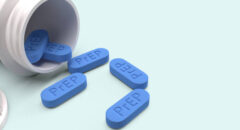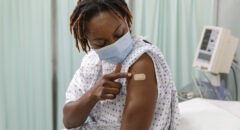
DID YOU KNOW: 1 in 8 people with HIV don’t know it yet? Knowing your HIV status can be life-saving information.Walgreens and Greater Than AIDS partnered to offer FREE HIV testing from June 23rd to June 25th. Beyond knowing your status, there are important facts to know about HIV and AIDS every sexually person should know.
This month, BlackDoctor.org hosted the Know Better: The Truth About HIV & HIV Testing Facebook Chat, sponsored by Walgreens, with expert insight from Keith W. Crawford, PhD, Health Scientist Administrator in the Division of AIDS, National Institute of Allergy and Infectious Diseases, NIH and Virginia A. Caine, MD, Director, Marion County Health Department.
If you missed this informative chat, take a look at the Q&A on the following pages.
For additional HIV resources and local testing sites, visit the CDC's site https://gettested.cdc.gov/ and visit http://GreaterThan.org/Walgreens for testing locations near you!

Virginia Caine: HIV is transmitted through bodily fluids from a person that is HIV positive to another individual through blood, semen, pre-seminal fluid, rectal fluids, vaginal fluids and breast milk.
In extremely rare cases, HIV has been transmitted by oral sex.
Keith Crawford: While it may be possible, the risk appears to be low, as stated. The risk is increased if the individual performing sex has cuts or abrasions in their mouth. Saliva produces some compounds that can inactivate HIV and this may help lower the risk.
Virginia Caine: It can also be shared by sharing needles or syringes and less commonly, from mother to child during pregnancy, birth, or breastfeeding.
Keith Crawford There are rapid HIV tests which can be administered practically anywhere and produce results in about 20-25 minutes. They can use saliva or blood. The most effective tests can detect a person’s antibodies to the virus in addition to detecting a key protein of the virus. While these tests are done with confidentiality, there are also home HIV tests that can be done in total privacy. What is extremely important to remember are two things: A positive test MUST be concerned by a medical professional because there are reasons the test could be inaccurate. At the same time, a negative test may not be accurate based on the timing of when the test is done after an infection. Always consult with experienced physicians, nurses or pharmacists to help understand your results and get appropriate medical care if necessary. This is ESPECIALLY true if you purchase a home test kit from a pharmacy.
Virginia Caine Most HIV test including rapid testing and home test are antibody tests. These are proteins that are produced in your body by your immune system when you are exposed to viruses like HIV or bacteria. It can take three to twelve weeks for an individual to make enough antibodies for an antibody test to detect HIV infection. There is an oral swab test, call OraQuick HIV Test that can you’re your results in 30 minutes or less. There is Home Access HIV-1 Test System that you can get results as early as the next business day. And you can get fourth generation blood test through a qualified testing center or personal physician.
Keith Crawford AIDS is an advanced from of HIV infection. It occurs usually after someone has been infected for a significant period of time (usually many years) and not received treatment. As a result, the immune system has been damaged and the person is at risk for many dangerous infections, certain types of cancer and other complications (e.g. nerve damage, kidney problems, dementia). If the person receives effective therapy, many of these problems will be reversed as the immune system is regenerated. It is much better to start treatment before the disease has progressed so it is important to get tested regularly.
Virginia Caine HIV (Human Immunodeficiency Virus) is the virus that weakens a person’s immune system by destroying important cells that fight disease and infection. If left untreated can lead to AIDS (Acquired Immunodeficiency Syndrome). AIDS is a diagnosis that is determined by special immune T cells called a CD4 count. When your immune system over time has become so low and less than 200 cubic millimeters of blood, you are vulnerable to the onset of one or more opportunistic infections. AIDS is often classified as an advanced stage of HIV where they are susceptible to life threatening opportunistic infections or cancers – not everyone will convert to AIDS.
Keith Crawford Yes the results of an HIV test are confidential and cannot be shared with anyone with your permission.
Virginia Caine Yes, they are classified as personal health information (PHI) and protected by federal and state statues.
Keith Crawford It’s more a question of what you do sexually instead of who you are. Different types of sex vary in the risk of transmission. Anal sex has a higher risk of transmission with the person receiving being at the highest risk and the person penetrating being at next highest risk. For vaginal intercourse, the woman is at greater risk than the man. Having a sexually-transmitted infection, like syphilis or gonorrhea can increase risk. For men, being uncircumcised increases risk. Black gay men are at very high risk. They are a marginalized group that face a lot of discrimination and often may not have access to education or services. Also, black heterosexual women have high infection rates. In some cases, even if the women do not engage in high risk behaviors (e.g. drugs, sex for money), their partners are often from high risk group (e.g. incarceration, drugs). Intravenous drug users are at high risk. While the rates in this group had been declining, the current heroin epidemic gripping the country may be reversing some of our gains. Needle exchange programs and use of HIV medicine for prevention can help in this group. Adolescents are at very high risk because they don’t often have good information. Parents and other adults may not know they are sexually active. They often aren’t responsible enough to protect themselves consistently and they lack the emotional maturity to be having sex. But remember, ANYONE can be at risk if they are sexually active and/or use recreational drugs.
Virginia Caine Those that have unprotected sex with a person who is HIV positive or a person those HIV status you do not know; sharing of syringes, those that may exchange sex for food, shelter, drugs and/or money. Those who may practice risky behaviors, like having anal or vaginal sex without using a condom or without taking medicine to prevent or treat HIV.
Virginia Caine Treatment for HIV includes anti-retroviral therapy (ART) which is medication people living with HIV take to stay healthy. These medications reduce the amount of virus in the body which keeps the immune system functioning and prevents illness. Another benefit of reducing the amount of virus in the body is that it helps prevent transmission to others through sex, needle sharing, and from mother-to-child during pregnancy and birth. This is sometimes referred to as “ART as prevention” or “treatment as prevention.”
There is a treatment called Pre-exposure prophylaxis (or PrEP) for when people at very high risk for HIV take HIV medicines daily to lower their chances of getting infected. This treatment is safe for a HIV negative person to take.
Keith Crawford Essentially, “Treatment as Prevention” means that by effectively treating an HIV-infected person, we are also preventing that person from infecting others. People who are on an effective regimen do not spread the infection. So in addition to helping keep that person healthy, their treatment also prevents others from getting infected.
This would not apply to a negative person since they don’t have an infection to treat. However, there are some ways that an HIV-negative person can protect themselves by using some of the same medicines used to treat the infection. A two-drug combination of HIV medicines can be taken by a person who isn’t infected and these medicines can block that person from being infected. This is called pre-exposure prophylaxis or PrEP.
Virginia Caine Yes, although People Living With HIV that are adherent to medications and have suppressed viral loads can greatly reduce the risk of transmitting HIV. The higher your HIV viral load the more likely you are to transmit HIV to others. When you are on effective medication, your viral load is very low or undetectable and greatly reduces your chance of transmitting HIV infection to someone else.
Keith Crawford There are several options. One option is to use condoms every time you have intercourse. Second, the infected person can start treatment. With effective treatment, there is a very low risk of the person transmitting the infection, but you must be sure they are taking their meds properly. Third, the person who is not infected can also take a combination of two HIV medicines which can protect them from the infection. This is called pre-exposure prophylaxis or PrEP. While some people do better if they take PrEP everyday, PrEP can be effective when taken around the time of intercourse, shortly before and also afterwards. Consult which a medical provider who has experience with these different options.
Virginia Caine You should consider taking the Pre Exposure Prophylaxis (PrEP) medication. It is a combination of two HIV medications sold under the name Truvada, that is one pill that is taken daily to help prevent an HIV negative person from getting an HIV infection by more than 90% through sex with an individual that is HIV positive and by more than 70% from injecting drug use with an individual that is HIV infected.
Keith Crawford Yes, you can. Whether it’s the mother or the father is infected, the use of medicines can protect the partner from becoming infected and also protect the infant if the mother is infected. Be sure to discuss your plan to have children with your medical provider so you can do everything the safest way.
Virginia Caine You can go to most physicians, community health centers, medical clinics, hospitals, Planned Parenthood, your local health department or state health department, which usually has a list of those agencies that do testing.
BlackDoctor.org Thank you Dr. Virginia Caine! One of the agencies offering HIV resources and testing information is the Centers for Disease Control & Prevention (CDC), via their sitehttps://gettested.cdc.gov/
Keith Crawford It seems that Walgreen's has a program for testing and the pharmacists should be able to counsel you on the results, positive or negative. It is probably easiest to just contact your local health department. You should also ask your private medical provider. We have been working hard to include HIV testing as part of routine medical care along with screening for diabetes, high cholesterol, cancers, depression, etc.
BlackDoctor.org You are correct Dr. Keith Crawford! Walgreens is offering FREE testing June 23 - June 25. To find local testing sites, readers can visit http://GreaterThan.org/Walgreens








